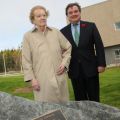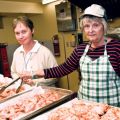News/Canada
ANTIGONISH, N.S. - The diocese of Antigonish in Nova Scotia no longer owes $16 million to 125 victims of clerical sexual abuse.
The diocese has made its final payment to settle a class-action lawsuit, the Canadian Press reports. The settlement was negotiated by former Bishop Raymond Lahey, who was arrested on charges of importing child pornography just three weeks after announcing the deal to settle claims dating as far back as the 1950s.
The lawsuit was initiated in 2002 by Ron Martin, whose brother committed suicide that year leaving a note about abuse he suffered at the hands of Fr. Hugh Vincent MacDonald. MacDonald was charged in 2003 but died before his trial could come to a conclusion.
The last payment is not the end of the process of healing, said diocesan spokesman Fr. Don MacGillivray.
“Healing always takes time,” MacGillivray told the Canadian Press. “But I’m a person of hope, and that’s what my faith calls me to be.”
The diocese put 150 properties up for sale, dumped its shares in the local weekly paper, The Casket, and drained savings from parishes to come up with the full settlement.
Cape Breton University honours pioneering nun
By Catholic Register StaffSYDNEY, N.S. - Cape Breton University recognized the contributions of Sr. Margaret Harquail to the school’s business program by naming a garden space in her honour.
Harquail Gardens is the new name of the space between the Verschuren Centre and the Shannon School of Business.
“Just as it is important for our university to progress, it is equally important for us to recognize those who have been instrumental to our success,” said Dr. John Harker, Cape Breton University’s president. “Sr. Harquail had a vision for our fine business school, and through hard work and commitment she helped shape the school into what it is today. The Harquail Gardens will be a lovely reminder of Sr. Harquail’s spirit and her contribution to the business community.”
Harquail established the School of Business Administration at the University College of Cape Breton, as well as the Canadian Institute of Management (CIM) certificate program. Harquail was also instrumental in establishing the College of Cape Breton as a university.
On hand for the ceremony was Minister of Finance Jim Flaherty, Harquail’s nephew.
Axing chaplains puts prisoners at risk
By Michael Swan, The Catholic RegisterFinding a home, a job, a purpose and peace for men who’ve spent most of their lives inside prison, addicted, raging and lost is never going to be easy. But Curtis Wiebe, who has spent 23 of his 45 years inside, has a suggestion for Public Safety Minister Vic Toews: Don’t cut programs that work.
When Correctional Services Canada decided in October not to renew the contracts of 49 part-time chaplains working in Canada’s federal prisons, it also meant cutting the programs they run — including the one that has helped Wiebe turn his life around.
As Wiebe neared release he moved from the maximum security Stoney Mountain institution near Winnipeg to the nearby minimum security Rockwood prison. In Rockwood he began meeting with a group led by part-time chaplain Sr. Carol Peloquin. The group called Next Step helped prisoners deal with the prospect of life on the outside in practical ways — driving them to appointments, finding a doctor, reconnecting with family when possible. It also selected a few men who both needed and wanted a supportive environment to live at Quixote House.
That’s where Wiebe is now, living with two Jesuit priests and four other parolees in an environment free of drugs and other negative influences, working on finishing high school, making plans for life beyond prison.
“I just couldn’t take it any more. If I had to come back (to prison) then my life’s over kind of thing,” said Wiebe. “And I like life, so I decided to stay out.”
But without Next Step and the part-time chaplain who runs it, staying out will be infinitely harder. Without Next Step there’s no path into Quixote House. Without Quixote House all Wiebe could afford on his disability pension would be a rooming house on the rough north side of town where drugs and alcohol are a constant presence.
There have been 67 men through Next Step over the last five years and three have gone back to jail for parole violations. All three were addicts and two were mental health patients. It’s a pretty good track record, said Next Step originator Peloquin.
“Quite a number of them are law-abiding citizens who would have jobs and are paying taxes, who wouldn’t be scaring the public,” she said.
The Jesuits and the Sisters of the Holy Name of Jesus, Peloquin’s community, are in the process of adding a third step to the supportive process of reintegration they’ve built on the Next Step program. Next door to Quixote House they are renovating an old crack house to create individual apartments to be known as the Massey Apartments — named after Jesuit Father Brian Massey who was a prison chaplain in Jamaica and Canada. Once complete, graduates from Quixote House will have a chance to try out independent living in their own apartment, but still with the support of Next Step.
Remove Next Step and the whole structure comes crashing down.
Correctional Services Canada gassed the $1.3 million-a-year part-time chaplain program without first working out what happens to the associated programs.
“A decision has yet to be made about all services that are connected with part-time chaplains,” reads an e-mail to The Catholic Register from the CSC media relations staff. “CSC is consulting with its various partners between now and the end of March 2013 to solicit their feedback and discuss the implementation of the full-time model of chaplaincy services.”
The Canadian bishops have kept their heads down while they quietly engage the federal prison service on a plan B.
“It would be sort of imprudent for us to comment,” said Whitehorse Bishop Gary Gordon, who acts as the liaison of prison ministry for the Canadian Conference of Catholic Bishops. “I know the commissioner and I know the chaplain management are working very hard to come up with viable options and alternatives and modalities of doing ministry.”
Central to the negotiations on how to do prison ministry without 49 part-time contract holders will be maintaining a memorandum of understanding between faith groups and CSC which stipulates the equivalent of one full-time professional chaplain for every 150 to 200 inmates.
So far Correctional Services has been talking up the 2,500 volunteers who contribute to chaplaincy.
Kathleen Mico, who earlier this year took over Next Step from Peloquin, is concerned that the dozens of volunteers she works with won’t have a program to volunteer for. It’s Mico, as the professional trained by Peloquin, who co-ordinates the volunteers for Next Step. If CSC takes away Mico, what will the volunteers do?
Given that just one prisoner in Stoney Mountain costs taxpayers about $100,000 per year, a program that keeps men out of prison on a quarter-time salary and two dozen volunteers is a pretty good deal, said Mico.
Not all groups affected by the decision to axe the chaplains are taking the behind-the-scenes approach of the Canadian bishops. Full-time federal prison chaplains are calling the decision a breach of non-Christian prisoner rights. Only one of the 80 full-time chaplains working in the federal prisons is not Christian.
While Toews claims a professional chaplain should be capable of serving the entire population regardless of religious affiliation — just as military chaplains do in the armed forces — Rev. Lloyd Bruce, full-time chaplain at the medium security Springhill Institution in Nova Scotia, isn’t buying it.
“Taking away professional chaplains of other world faith traditions is taking away hope from others who are struggling to turn their lives around,” Bruce wrote in a letter to Toews.
“Your decision not to renew part-time contracts with faith communities for provision of chaplaincy services with Correctional Service Canada will essentially eliminate chaplaincy services for non-Christians,” wrote the Moderator of the United Church of Canada Rev. Gary Paterson.
While the decision affects Buddhists, Jews, Jains and others who won’t have access to their own clergy unless those clergy volunteer, the 40 per cent of federal prisoners who are Catholic will be hit harder, said Gordon. Lay and Protestant chaplains may be very good counsellors and advocates for prisoners, but they can’t hear confessions, celebrate Mass, anoint the sick. Catholic canon law defines a chaplain as a priest.
Since 1975 Canada has endorsed the United Nations Standard Minimum Rules for the Treatment of Prisoners, which guarantees prisoners the right to access their own clergy. But that minimum standard is no help when it comes to maintaining the part-time chaplains.
“We’re quite aware that the government is under no obligation to pay for it. They are under an obligation to open the doors, access,” said Gordon.
Mico is one of just two part-time prison chaplains whose contract extends beyond next spring. But when her contract runs out in 2014 she’ll have to find another job. She simply can’t keep co-ordinating Next Step for free.
As the Catholic bishops look for solutions their primary interest is in maintaining service to prisoners, said Gordon.
“I can quite honestly and definitively say that as a Catholic Church we serve people. If we can get the remuneration to put those things in place, then we can serve them better,” he said.
MP invites civil society to join the fight against human trafficking
By Deborah Gyapong, Canadian Catholic NewsOTTAWA - It is one thing to set victims of human trafficking free but quite another to get them started on a new life.
“They believe they are good for nothing,” said Conservative MP Joy Smith. “This is so wrong. It breaks my heart. A lot of these girls were lost and had no support to get back on their feet.”
With that in mind Smith has launched a foundation to invite the public to participate in the fight against human trafficking.
The Joy Smith Foundation is a registered, non-profit organization where “every red cent goes to the victims and the NGOs that take care of them,” Smith said.
The foundation is a follow-up to the federal government’s National Action Plan to Combat Human Trafficking announced in June 2012. Non-political and non-partisan, the foundation is all about the victims,, Smith said.
Victims are “so traumatized they need support” to “start their lives again,” she said. They “need a vision” to rebuild their lives.
“I’m trying to be a role model for the public to show them what they can do,” Smith said. The money goes to the victims to provide rehabilitation to prepare them for a new life outside the sex trade; for clothing, counselling, housing, and money, “all those important everyday things.”
She recalled the court testimony of one trafficking victim who said she felt “good for nothing except giving sex to men.”
The foundation’s other component is building awareness of the plight of trafficking victims and the “unsung heroes” among police officers who rescue them and the NGOs that look after them, Smith said. “These people need to be thanked.”
Smith said people do not realize how hard it is to work in the human trafficking field and the kinds of blocks one runs into, from “judicial blocks” to the blocks from one’s peers in the police force. The work can be discouraging and depressing because the damage to trafficked women and children is so horrible, she said.
“It’s all about love, your love for girls and a desire to give them a fresh start,” she said.
Smith is the first MP in Canadian history to cause amendments to the Criminal Code twice through private member’s bills. Bill C-310 added a mandatory five-year sentence to those convicted of trafficking children under 18, and C-268 made human trafficking an extra-territorial offence, allowing prosecution of Canadian citizens or residents for trafficking crimes committed in other countries.
More information about the foundation can be found at www.joysmithfoundation.com
Pro-lifers must adapt their message, MPs say
By Evan Boudreau, The Catholic RegisterTORONTO - Political lobbying is not just about what you say, it’s how you say it, according to a pair of Conservative MPs. That was just one of the tips Stephen Woodworth and Brad Trost gave to those attending the National Pro Life Conference.
“Although I am in Parliament, I happen to believe that the world does not stop and end inside the House of Commons,” said Woodworth, MP for Kitchener Centre. “The real important work that needs to be done is outside the chamber of the House of Commons.”
Much of this has to do with language and scope, Woodworth told those attending the third and final day of the conference hosted by Alliance for Life Ontario in Toronto Oct. 25-27.
Woodworth said too many MPs are pre-occupied with the word abortion. By adjusting the language and widening the scope of the message, the pro-life movement will garner more support by avoiding sensitive words — something Woodworth admits is easier said than done.
“People don’t necessarily take away from words the meaning that I take away from them,” Woodworth said. “We have members of Parliament who are actually suggesting, in relation to Motion 312, that the Prime Minister should have a veto over the independence of backbench MPs.”
Woodworth said some MPs “couldn’t see the democratic tradition and the value of backbench independence” and “they were willing to sacrifice because of their pre-occupation with the word abortion.”
Although Motion 312 — Woodworth’s motion for a debate on when life begins — did not mention the word abortion, it led to its failure.
But Woodworth does not completely blame the failure on those MPs pre-occupied with abortion — pro-lifers are at fault too for not being able to adapt how they communicate their message.
“If you simply go in with your truth and you fail to recognize the truths that others are concerned about, you won’t make that connection, you won’t develop that relationship and you won’t be listened to,” he said. “If you cannot convince someone that a child is a human being before birth you are not going to convince them about abortion.”
While Woodworth focused heavily on how to convey the message, Trost addressed how to understand a politician’s position on the pro-life cause.
“The weakest link in Canada’s pro-life movement has been political,” said Trost, MP for Saskatoon-Humboldt. “In Canada we know the political aspect is very important and the political aspect needs to change and evolve and we need legislation to start moving it forward.”
As a Liberal turned Conservative, but a constant pro-life supporter, Trost cautioned the audience to never assume which way a politician will vote.
“People don’t actually know what they’re voting for or what they’re voting on (when electing politicians),” said Trost.
“Politicians can do one thing in Ottawa and another thing in the constituency. People are shocked when they find that out.”
He continued by stressing the importance of checking an MP’s voting records to see who stands strongly on either side of the issue, but also exposes those in the middle who’d be easier to influence.
“If you don’t know where your MP has voted, get involved, talk to them. A lot of these people who have come in from professional careers may not have fixed views. "
Pro-life activist Linda Gibbons counts on Christ’s strength
By Deborah Gyapong, Canadian Catholic NewsOTTAWA - Pro-life activist and Queen’s Diamond Jubilee Medalist Linda Gibbons is back in prison, certain she is doing God’s work for praying outside an abortion facility.
Police moved in and arrested her Oct. 30 after the 64-year-old great-grandmother prayed outside of the Morgentaler abortuary on Hillsdale Avenue in Toronto, breaking a temporary injunction prohibiting demonstrators from coming too close to the facility and impeding its business.
Gibbons carried her usual sign depicting a picture of an infant and the words: “Why Mom? When I have so much to give.” Police moved in after about an hour and a half and arrested Gibbons.
“We will remain free in our love, we will not be coerced by the government to turn our backs on the unborn child,” Gibbons told CCN in an exclusive phone interview from Toronto days before her latest arrest. “If that lands us in court, that’s a gift, another providential opportunity to do the Lord’s work.
“When hoping and praying become a criminal activity, where is our freedom?” she asked.
Gibbons said her fellow inmates often ask her how she can stand the confinement, and being away from her family.
“I always tell the girls, ‘One day at a time with Jesus.’ It is Christ’s strength that gives you that fortitude to persevere,” she said.
The injunction dates back to 1989 after the former Morgentaler clinic on Harbord Street was firebombed.
Morgentaler built a bigger and more secure facility at the Hillsdale Avenue location that is covered by the temporary injunction creating a bubble zone around it.
Gibbons recalled the first time she was arrested. She and some fellow pro-lifers were in the alley behind the facility praying in a circle. They were not blocking the entrance or talking to people or doing anything that might impede Morgentaler’s business operation, she said.
She knew she would lose her job at military headquarters if she was arrested. But the words of Christ in the Garden of Gethsemane came to her: “Can you not pray with me for one hour?” She realized her job “is something I must lay down.”
“Anything I put before Christ is not where I should be at the moment,” she said. “Doing the will of Christ is my first duty and the duty of the moment.”
In between arrests Gibbons used to try to get a job so as to maintain her apartment, but she realized hanging onto her home or an income was unrealistic.
“For 20 years, I have had no government support; I’m on no government program,” she said. “Pro-lifers have are carrying me through.”
A great-grandmother of two, Gibbons does miss her family when she’s in prison.
“I see this as a cost of doing business with the government,” she said. “I’m trying to leave a legacy for my grandchildren, so they don’t have to live in a society burdened by abortion.”
75 years living the Gospel
By Michael Swan, The Catholic RegisterThe Felician Sisters this year look back on 75 years of careful, quiet and competent work on behalf of people the rest of us have brushed aside.
A human scale and a human touch have been their hallmark.
“Our goals are more modest in terms of structures and things like that,” explains Felician Sister Shelley Marie Jeffrey. “We just think it’s more important to touch people’s spirit than to be behind something that people will look at and say ‘Wow.’ ”
In 1937, in the teeth of the Great Depression, most of the sisters were Polish immigrants or daughters of Polish immigrants. They arrived in a poor, immigrant neighbourhood near Dundas and Bathurst Streets where men were unemployed or on the road or both and women were struggling to keep families together and their kids in school.
The sisters set themselves up as go-betweens, translating and interpreting the English world to the Polish immigrants, helping the kids with homework, gathering women to talk over troubles and challenges, keeping the youngest safe and occupied.
In the forms of after-school programs, youth drop-ins, ESL classes for adults and computer classes, the work the Felicians began in 1937 continues today.
“We still work with immigrants. There are a lot of families whom we serve that are new to Canada,” Jeffrey said.
In 1937 the broken economy produced its share of broken people. That hasn’t changed either. The sisters still feed and clothe people who are never going to be contributors to the economy.
“The people we serve are the lepers of society,” Jeffrey said. “I don’t mean that in a derogatory way. But they’re the outcast people that we don’t want around. They’re mentally ill.They’re addicted. They don’t present themselves very well.”
Hot meals and clean clothes available at the St. Felix Centre only open the door to what the Felicians really offer to the poor, said St. Felix Centre executive director Paddy Bowen.
“We are not in the business of changing people. We are in the business of accepting them — where they are and what they are.”
Foundations and governments mostly want agencies to fix the poor — get them jobs, find housing, cure addictions and illnesses. There’s nothing wrong with that, but the sisters are there for a different purpose, said Bowen.
“We are actually not in the fixing or changing or transforming arena. Although, what you find of course is that there is nothing more transforming than being accepted,” she said.
The next step after acceptance is community. By offering people meals in a human-scale, intimate dining room and allowing time to sit and talk, the sisters have for years invited people into their community. It’s that sense of community that makes the St. Felix Centre a little different from the 75 other drop-ins in Toronto.
The St. Felix Centre community extends well beyond the poor, homeless and socially isolated. The centre runs with just seven full-time staff and 450 volunteers.
But this last year the invitation has gone a step further. The Felicians no longer live in the gingerbread mansion that was their convent back in 1937. A group of women and their children now occupy the house, which will soon undergo renovations so it can comfortably house even more.
“We developed that program specifically not to be a rooming house,” said Jeffrey. “But to be a community. That’s what we know. We know the value of it and we know the challenges of it.”
It’s a classic case of a religious order sharing its charism — letting everybody in on their mission.
“Our call is to live in Franciscan community. It is to live in simplicity. It’s to be responsive,” Jeffrey said. “We’re not unique in that, but we find ways to be unique. We’ve never specialized in one ministry. There are no two people in our community doing the same thing.”
Nor are the Felicians satisfied to keep doing the same thing year after year.
The neighbourhood around the St. Felix Centre is changing rapidly with injections of new money , condos and professionals who choose a downtown lifestyle. The sisters have been looking around to see where their talent for creating community might be needed more.
At 2195 Jane St., a 46-year-old, 11-storey tower operated by Toronto Community Housing Corp., the sisters have launched a weekly communal dinner for Jane- Finch residents. Depending how local partners and the community react, the program may expand to seven days a week.
For the sisters, discernment means slowly and carefully figuring out what people really need and how they can help.
“Given our resources, given our experience, what can we offer that other people can’t?” is the central question, said Jeffrey.
“The Felicians are down to under 40 in Canada,” said Bowen. “How often do we see a group of people who just selflessly dedicate their lives to living for other people?
“The new evangelization is terribly challenging but it’s also really exciting,” said Jeffrey. “Our main approach to evangelization here is, we don’t try to evangelize except by the way we live the Gospel values.”
Supreme Court to hear prostitution appeal
By Deborah Gyapong, Canadian Catholic NewsOTTAWA - The Supreme Court of Canada has agreed to hear an appeal of an Ontario Court of Appeal ruling that upheld most of a lower court’s decision to strike down some of Canada’s prostitution laws.
The federal government had applied for leave to appeal to the Supreme Court in late May.
Prostitution is not illegal in Canada, but activities surrounding it are: soliciting for the purposes of prostitution, running a brothel or bawdy house and living off the avails of prostitution or pimping.
But in a landmark ruling March 26, the Ontario Court of Appeal rendered a decision that legalizes brothels and allows prostitutes to hire protection and other staff. Public solicitation and pimping remain illegal but the court ruled that prostitutes have a constitutional right to work in safe environments such as an organized brothel.
However, the Ontario court suspended implementation of its decision for one year to give Parliament time to amend the criminal code.
The Catholic Civil Rights League welcomed news of the appeal.
“With our partners REAL Women of Canada and Christian Legal Fellowship, we have been intervenors in this case from its beginning in Ontario Superior Court,” said league executive director Joanne McGarry.
“Our position was and remains that while the law is not perfect, any liberalization of it would not improve prostitutes’ safety, and would make it easier to lure and exploit vulnerable girls and women
“Evidence from other jurisdictions suggests that when legalization occurs, the illegal side of the business continues to flourish,” she said in a statement.
REAL Women of Canada national vice president Gwendolyn Landolt says she and the other two groups expect to file their intention to intervene by next April.
Landolt said REAL Women would like to see prostitution itself prohibited.
“We do want to see that women who are prostitutes have an option to get off the streets, into safe houses and to receive treatment,” said Landolt, who noted many have problems with alcohol or drugs and sell sex to maintain their addictions.
“They need help. You don’t encourage them by widening the law.”
She said cases where prostitution laws have been loosened have not brought more safe conditions for prostitutes.
“Brothels do not protect women,” she said. “In the Netherlands, one-third of brothels had to be shut down because the criminal element became involved.
“Prostitution is inherently dangerous, no matter what circumstances are involved.”
Landolt warned about the consequences to women and children who are being trafficked into, out of or across Canada into the sex trade. Canada is already a transit country for traffickers bringing sex slaves into the United States, she said. Aboriginal women and children are especially vulnerable to trafficking.
“Human trafficking is one of the most lucrative criminal undertakings in the world,” she said, along with the sale of illegal weapons and the drug trade.
Kateri teaches us to have hope
By Deborah Gyapong, Canadian Catholic NewsSt. Kateri teaches us our response in faith to Jesus Christ brings healing, said Edmonton Archbishop Richard Smith at a Thanksgiving Mass in Rome Oct. 22.
“Among the most striking aspects of her witness is the miraculous transformation of her face soon after her death,” said the president of the Canadian Conference of Catholic Bishops (CCCB) in his homily at St. John Lateran, Rome’s cathedral church. “From the age of four, terribly scarred by the smallpox, her face was restored to its original beauty only minutes after she had died.”
Smith noted Kateri said “Jesus, I love you,” just before she died, showing how her response to Christ’s love preceded the healing.
“How greatly do we need this lesson from Kateri today,” he said. “We may not bear physical scars, but so many today carry deep emotional and psychological ones.
“These are inflicted not by smallpox but by poverty, addiction, loneliness and betrayal. They are caused by the abuse suffered by Kateri’s modern-day sisters and brothers in their time at residential schools,” he said. “So much pain, so many emotional scars. Yet Kateri teaches us that no wound, however deep, should leave us without hope.”
The archbishop called the facial healing “an outward sign of the interior transformation that is given to all who hand over their lives to Christ, and who do so in love.”
The Mass, televised live by Salt + Light Television, drew more than 2,500 people, many of them Canadian pilgrims. Almost 20 Canadian bishops were present, including concelebrants Bishop Lionel Gendron and Auxiliary Bishop Louis Dicaire of Saint Jean-Longueuil, who serve the diocese that includes the Mohawk territory where St. Kateri died. The all-party delegation led by Canada’s Speaker of the House of Commons, Andrew Scheer, attended as did Canada’s ambassador to the Holy See, Anne Leahy.
“The meeting of God’s loving initiative with a grace-filled human response is on beautiful display in the life of St. Kateri,” said Smith, who said her name Tekakwitha was one of the earliest signs.
Tekakwitha has a variety of interpretations: “she who feels her way ahead,” “moving forward slowly,” “one who bumps into things,” but also “one who places things in order” or “to put all into place,” the archbishop said.
“It is, of course, true that Kateri’s physical sight was seriously compromised due to the smallpox from which she suffered,” he said. “What is equally true, however, and what is of far greater significance, is that her inner vision was clear.
“Deep within her heart she had received the gift of seeing clearly the truth of Christ and His Church. It is as if God, through the very name Tekakwitha and the life of the one who bore it, has drawn attention to the limits of human vision in order to point us to the true sight that comes from faith.”
Smith tied the canonization of North America’s first female indigenous saint with the Year of Faith and the Synod on New Evangelization taking place in Rome until Oct. 28.
“Kateri reminds us that this new evangelization, to be effective, must not only be proposed anew but also find an open and ready welcome in the heart of the recipient,” he said. “When the Jesuit missionary, Fr. de Lamberville, spoke of our Lord and the Christian faith, the Gospel message of life and hope found a home within her.”
He called Kateri’s response to the Gospel message a “work of grace.”
“Only with the help of God’s grace are we able, like Kateri, to make of our entire lives a living and pleasing sacrifice to God, as St. Paul exhorts us to do,” he said. “Only with divine assistance do we become, like Kateri, the mothers, brothers and sisters of Christ by doing the will of His — and our — heavenly Father.”
An estimated 1,500 Canadian pilgrims attended the canonization in St. Peter’s Square, most of them from First Nations and other aboriginal communities. Among the 17 Canadian bishops was Toronto Cardinal Thomas Collins.
“Throughout her short life, St. Kateri never abandoned her faith,” said Prime Minister Stephen Harper in an Oct. 21 statement.
“The canonization of St. Kateri is a great honour and joyous occasion for the many North Americans and aboriginal peoples who cherish her witness of faith and strength of character. The Government of Canada stands with those who are celebrating her life on this day in Canada, the United States and throughout the world.”
The canonization Mass Pope Benedict XVI celebrated Oct. 21 is available via the cccb.ca web site or at www.saltandlighttv.org.
Catholic justice program under attack at Brock
By Michael Swan, The Catholic RegisterA woman’s studies professor at Brock University in St. Catharines, Ont., is within her rights to criticize and badger volunteers who work at a Catholic-inspired social justice program on campus, the Ontario Human Rights Tribunal has ruled.
The decision was the latest episode in a five-year war of words between the university’s women’s studies program and Solidarity Experiences Abroad, a program that places students from the school in volunteer jobs in Latin America and is administered by the university’s Roman Catholic chaplaincy.
Women’s studies and sociology professor Ana Isla alleges that the SEA program has ties to “far right” and “cult-like” Catholic organizations in Peru. She claimed in a motion passed by the women’s studies program committee in 2011 that “there have been documented cases of physical and psychological abuse, classism, sexism, racism and homophobia in activities related to Solidarity Experiences Abroad.”
German McKenzie, who ran the SEA program at Brock for eight months in 2010 and continues to volunteer with the chaplaincy office, complained of Isla’s rhetoric to the Human Rights Tribunal in January. In his Oct. 9 decision, Ken Bhattacharjee said the tribunal should not intervene in the internal affairs of the university where issues of academic freedom are at stake.
“In my view, given the importance of academic freedom and freedom of expression in a university setting, it will be rare for this tribunal to intervene where there are allegations of discrimination in relation to what another person has said during a public debate on social, political and/or religious issues in a university,” Bhattacharjee wrote.
McKenzie claims he wasn’t trying to limit anyone’s academic freedom, only protect his reputation.
“I respect academic freedom, but academic freedom has to be exercised responsibly,” McKenzie told The Catholic Register. “How do you balance that in a university? That’s a big thing. I’m not saying it’s easy.”
He had asked the tribunal to suspend the case while the university’s own human rights committee looks into the case. But once started, the tribunal decided to render its decision.
“From my side, it makes sense for everybody to solve this grievance at the lower level than at the higher,” said McKenzie. “That’s what common sense tells me.”
Brock University chaplain Raoul Masseur expects the university’s human rights committee to issue a report very soon. University administration refused to comment on the committee report.
McKenzie is a doctoral candidate at Catholic University of America who expects to graduate with a PhD in secularization theory in the coming months. He hopes to launch an academic career in Canada and felt Isla’s campaign against SEA and himself were poisoning his chances.
Brock administration has already once ruled that Isla’s accusations are unfounded and that the relationship between the university and SEA has been beneficial to the university. The university’s “internationalization committee” investigated Isla’s allegations against SEA in January and found “there was no compelling evidence to support such an action (severing ties with SEA) and further affirms its support for this partnership.”
The committee, headed by university provost Murray Knutila, said that consenting adults should be trusted to make an informed choice about whether or not to participate with SEA, so long as the program was clear about its affiliations. While inspired by Catholic social teaching, the program is a non-denominational invitation to the whole Brock community, said Masseur, the SEA founder.
Isla’s campaign against SEA was bolstered last year by the CUPE-financed Occupy Brock movement on campus.
“We ask to take a stand and only officially sanction volunteer opportunities with non-religious organizations,” associate dean of social sciences June Corman told an Occupy Brock rally Sept. 17, 2011. “And that in fact, all course work opportunities at Brock also not be involved with specific religious organizations.”
SEA has more than 360 Brock students, faculty and alumni preregistered for solidarity trips in this academic year. As the movement to cut ties to SEA gained ground last winter it took Masseur less than a week to gather 200 letters of support from more than 1,200 past participants in SEA trips.
E-mails and phone calls to Isla for this article were unanswered.
Edmonton twins with northern diocese
By Ramon Gonzalez, Canadian Catholic NewsEDMONTON - The Edmonton archdiocese and the diocese of Mackenzie-Fort Smith have entered into a twinning arrangement that may lead to more co-operation between the two dioceses.
Edmonton has sent a priest to Mackenzie-Fort Smith and will give half the proceeds from its Nov. 21 Jubilee Gala to this northern diocese to help pay for a new church.
“This is sort of a partnership of mutual support and mutual enrichment,” said Archbishop Richard Smith, who will visit Mackenzie-Fort Smith in March.
In an Oct. 15 interview, the archbishop said this type of twinning arrangement goes back to the 1990s when Blessed John Paul II in his apostolic letter Ecclesia in America encouraged the dioceses of the Western Hemisphere to consider ways that they may enter partnerships with one another of mutual support.
As the question arose about a partnership between Edmonton and another diocese, Smith said his thoughts naturally turned towards South America.
“But as we talked internally about this more and more the question came up what about the needs of our people in the North of Canada?” he said.
The idea of Edmonton, the gateway to the North, twinning with Mackenzie-Fort Smith resonated with local Catholics, he said. Smith said the twinning also recognizes that the Edmonton archdiocese was established through the efforts of missionaries.
“We are the result of a missionary effort and that’s a reminder to us that the Church is and must always be missionary in its outreach.”
Mackenzie-Fort Smith Bishop Murray Chatlain said he is pleased with the twinning. Apart from the sharing of human and material resources, it “will give people (in the Edmonton archdiocese) a chance to understand more who we are, what our life is like and what are some of our blessings and challenges.”
The wheels of the twinning agreement are already in motion. Last June, youth leader Andrew Papenbrock visited Mackenzie-Fort Smith to lead a workshop on youth ministry. Since then, Papenbrock has helped the northern diocese with other youth ministry issues, Chatlain said.
As well, Fr. Arlan Parenteau, an Edmonton priest, was recently sent to serve the northern diocese. “Obviously this is a sacrifice on our part because we certainly need every priest that we can have, but at the same time we have to recognize that the Lord calls us to be generous,” Smith said. Smith said the two dioceses will ask what gifts they can share. When Chatlain spoke in Edmonton at the archdiocese’s Nothing More Beautiful event, Smith recalled, he talked about the great importance that is placed in the North on silence in the encounter with the other.
“That’s something our busy Western culture needs to learn — the value of silence and, within silence, encountering the reality of the other and encountering the reality of God in our midst.”
Chatlain said many people in his diocese travel to Edmonton, especially when facing serious medical issues, and end up attending the city’s parishes. The partnership may enable a deepening of those relationships, he said.
Chatlain said Mackenzie-Fort Smith and Edmonton are also encouraging the twinning of parishes from the dioceses. Funds from the Jubilee Gala, which he will attend, might be used to help renovate the church in Tuktoyaktuk and build a new church in Fort Simpson.
The Mackenzie diocese has 11 priests to cover about 38 communities.
“If we have 10 or 11 healthy priests, I think for the size we are it’s okay,” he said.
“What we are trying to do is to encourage the local leadership.”
Lay people, Chatlain said, lead services, funerals, Baptisms and even perform marriages.
(Western Catholic Reporter)











